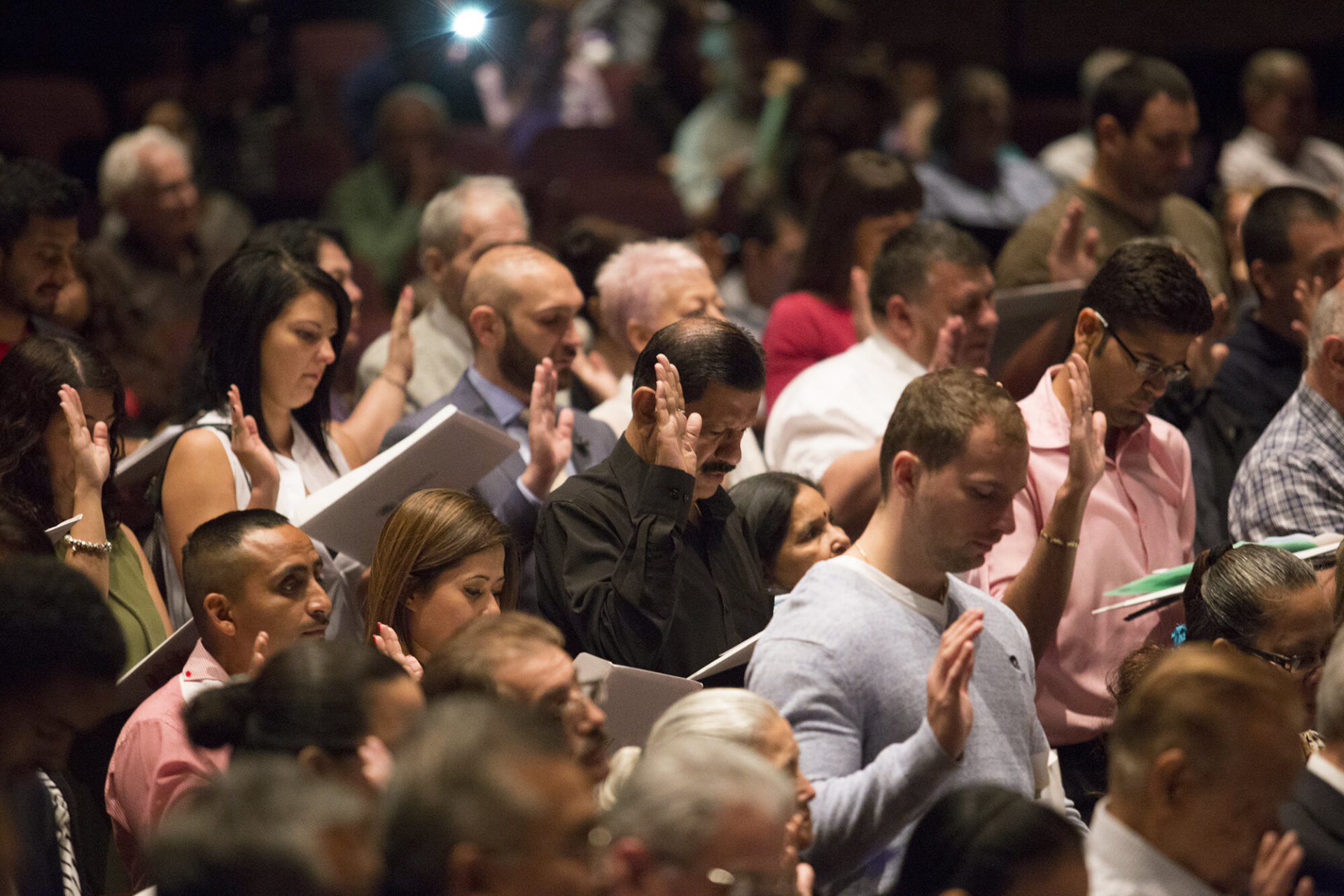
This week, the Trump administration rolled out sweeping changes to the test immigrants must take to become naturalized United States citizens.
The test is longer and harder.
In the previous exam, hopeful American citizens were asked up to 10 questions during an interview and had to answer six correctly to pass.
Now the passing score has changed to 12 out of 20.
According to The New York Times, “it is also more complex, eliminating simple geography and adding dozens of possible questions, some nuanced and involving complex phrasing, that could trip up applicants who do not consider them carefully.”
Here are just three examples of new questions:
“Who does a U.S. Senator represent?”
The previous answer was: “all people of the state.” The new test answer is “citizens of the state.”
Next: “Why does each state have two senators?”
Acceptable answers are an equal representation for small states or The Great Compromise (or Connecticut Compromise).
And finally: “What are three rights of everyone living in the United States?”
Some of the accepted answers include freedom of speech, freedom of assembly, freedom of religion.
Not listed: the rights to counsel, due process, equal protection, and freedom from cruel and unusual punishment or unreasonable search and seizure.
Incoming President Joe Biden could overturn the test changes, but it would take months. Immigration organizations are warning that this is too much. It will make it harder for poor immigrants from non-English speaking countries and suppress the number of citizens who vote.
Speaking to The New York Times, the executive director of the Immigrant Legal Resource Center in San Francisco said this:
“It’s a last-ditch effort on their way out the door for the administration to keep people from realizing their dreams of becoming citizens. There is no legal reason, no regulatory reason to do this.”
The U.S. Citizenship and Immigration Services says the current pass rate for the exam is 91%.
Last year when the agency announced the exam, Ken Cuccinelli, who served as the acting director, defended the move, saying:
“Updating, maintaining, and improving a test that is current and relevant is our responsibility as an agency in order to help potential new citizens fully understand the meaning of U.S. Citizenship and the values that unite all Americans.”
Two years ago, I delivered a commencement address at Delaware Valley University. My focus was on civics education.
I opened by telling the graduates that I had one last test for them before they went out into the real world – no grading and only four questions. Each question was on the old version of the naturalization test.
First, the House of Representatives has how many voting members?
435.
Second: What do we call the first ten amendments to the Constitution?
The Bill of Rights.
Third: How many justices are on the Supreme Court of the United States?
9.
And fourth, on what day was the declaration of independence adopted?
July 4th, 1776.
In the fiscal year 2019, 834-thousand people became new citizens by answering those questions.
So I asked the grads for a show of hands – who got all of those questions correct?
My point was that most of us bypassed this process because our citizenship came with birth in this country.
But if your citizenship were dependent upon your knowledge of our government, would you make the cut?
If not, you have company. According to an August survey by the Annenberg Public Policy Center of the University of Pennsylvania, Americans’ knowledge of civics has improved this year during the pandemic… but that’s still not saying much.
Only 51% of Americans could name all three branches of government, up from 39% last year.
More than half of Americans – 54% – know that a 5-4 supreme court decision holds the same weight as a 9-0 decision.
And remember how that new question on the naturalization test asks hopeful citizens to name three rights given to U.S. Citizens?
Well, 19% of Americans couldn’t even name a single first amendment right.
So here’s my position: I’m ok with a high bar to become a U.S. Citizen.
But I wonder how many others who will cheer the naturalization exam’s added difficulty – could themselves pass it? Many of us caught a break because we were born here. Lucky for us, we don’t have to answer 12 of 20 questions about civics.
It’s easy to strengthen a test for newcomers.
The real question is not how we quiz the understanding of those seeking naturalization, but how do we raise the civic knowledge of those who are citizens by virtue of their birth?
In June, I moderated a virtual fireside chat with Secretary Leon Panetta and Ambassador Susan Rice for the National Commission on Military, National, and Public Service.
The commission had just released its final report, “Inspired To Serve,” to Congress, the president, and the American public with 164 specific recommendations to build a culture of service in America.
They did great work, and in the executive summary, made this point:
“In the course of its work, the commission identified a major flaw in the American educational system: the lack of exposure to high-quality civic education for students throughout much of the nation.”
Fixing that – is the hard part.
______________________________________________________________________________________________________________________

Michael Smerconish
Using the perfect blend of analysis and humor, Michael Smerconish delivers engaging, thought-provoking, and balanced dialogue on today’s political arena and the long-term implications of the polarization in politics. In addition to his acclaimed work as nationally syndicated Sirius XM Radio talk show host, newspaper columnist, and New York Times best-selling author, Michael Smerconish hosts CNN’s Smerconish, which airs live on Saturday at 9:00 am ET.
______________________________________________________________________________________________________________________






